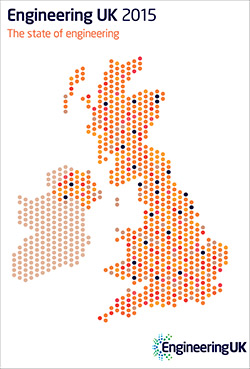Industry group calls for doubling of engineers
12th January 2015 UK: The lead industry group EngineeringUK has called for a doubling of engineering apprentices and graduates to meet UK employer demands.
UK: The lead industry group EngineeringUK has called for a doubling of engineering apprentices and graduates to meet UK employer demands.
The report, The State of Engineering 2015 produced by EngineeringUK, analyses the engineering industry’s capacity and capability for growth and details engineering in education, training and employment. It shows that engineering accounts for a quarter (24.9%) of UK turnover -– 9% higher than at the start of the recession. However, we need more engineers. Engineering companies will need 182,000 people per year with engineering skills in the decade to 2022 but there is a current annual shortfall of 55,000 skilled workers.
EngineeringUK, formerly the Engineering and Technology Board (ETB), is an independent, not-for-profit organisation whose purpose is to promote the contribution that engineers, and engineering and technology, make to society.
EngineeringUK is calling for either a doubling of the number of engineering graduates or a 50% increase in the number of engineering and technology and other related STEM (science, technology, engineering, and mathematics) as well as non-STEM graduates who are known to enter engineering companies.
The group wants to see this reflected in schools with a doubling of the number of young people studying GCSE physics as part of triple sciences and a growth in the number of students studying physics A level (or equivalent) to equal that of maths. It also wants this to have a particular focus on increasing the take-up and progressing by girls and improvements in the provision of careers inspiration for all 11-14 year olds.
 It also wants to see a two-fold increase in the number of Advanced Apprenticeship achievements in engineering and manufacturing technology, construction planning & the built environment and information and communications technologies.
It also wants to see a two-fold increase in the number of Advanced Apprenticeship achievements in engineering and manufacturing technology, construction planning & the built environment and information and communications technologies.
Writing the foreword to the report, Vince Cable, secretary of state for business, innovation and skills, says: “A strong British engineering sector is vital to the long term sustainability of our economic recovery, and increasing the supply of engineers is at the heart of this. In Government, we’re working hard to make sure we have the skills we need in 2022 and beyond, but we need to work with industry to make sure we inspire the engineers of tomorrow, today.”
Drastic shortage

The report reflects the findings of other recent reports, particularly the recent Institution of Mechanical Engineers study Five Tribes: Personalising Engineering Education.
Commenting on this latest report. the IMechE’s chief executive Stephen Tetlow said: “This report shows the UK is facing a cliff-edge. It provides sobering statistics on the drastic shortage of engineers the UK faces. Every politician and policy-maker must understand the messages it is sending.
“It shows that unless we double the number of places for graduates and apprentices in our universities, colleges and training centres, not only will our vital industries and infrastructure fail, we will surrender any chance of future growth. We are about to surrender GDP. It’s as simple as that.
“Engineers contribute over £1 trillion to the economy. That’s four-times the retail sector. Even more importantly, engineers are at the heart of nearly all of the country’s vital sectors: from transport and energy through to healthcare and construction. They not only underpin the economy, they are vital to the very essentials of life: water, energy and food production. Engineers play critical roles in nearly all parts of society, not just the engineering ones we imagine. These vital sectors and all the opportunities for jobs, prosperity and growth are now dangerously at risk of failing. Most are now reporting serious shortages of the skills they need to survive, let alone grow. We need to be recruiting 182,000 people with engineering skills every year, but current levels are falling far short at just over 100,000 a year. And it’s been going on for years.
“What this report makes clear is that we need a wholesale change in the way we value science and technology in schools and society. We can no longer rely on appealing just to the small proportion of people who are passionate about science technology engineering and maths subjects. We need science and engineering to be brought to life in the school curriculum and resources prioritised so that we can start to plug the appalling gaps we face. We need to understand the fundamental role engineers make to just about every walk of life and to our health and well-being. Resources need to be prioritised accordingly. And it’s not just Government that needs to take action. Employers of engineers need to welcome teachers, students and parents through their doors to show just what an exiting career can be had as an engineer.
“We must grasp the opportunity before it is too late. If we get it right, we can not only save our economy from failure, but we can boost the UK’s economy by an additional £27bn per year if we want to. We must ensure we have the skills in place to make this happen. If ever there was a wake-up call – this is it.”
The Engineering UK 2015 The State of Engineering report is available here.







